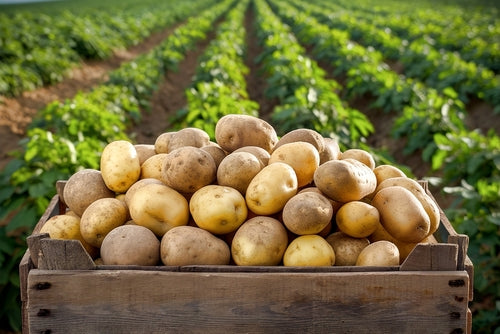
The Healing Power of Potatoes: A Natural Remedy for Gastritis
Share
Gastritis, characterized by inflammation of the stomach lining, affects millions worldwide, leading to symptoms such as abdominal pain, nausea, bloating, and indigestion. While conventional treatments include medications and dietary adjustments, natural remedies have gained attention for their potential benefits. Among these, potato juice stands out as a traditional remedy believed to alleviate gastritis symptoms. This article explores the properties of potatoes, their role in managing gastritis, and how to incorporate them into your diet for optimal digestive health.
Understanding Gastritis
Gastritis occurs when the stomach's protective mucous lining becomes inflamed or eroded, often due to factors like excessive alcohol consumption, prolonged use of nonsteroidal anti-inflammatory drugs (NSAIDs), Helicobacter pylori infection, or chronic stress. Symptoms can range from mild discomfort to severe pain and may include:
- Upper abdominal pain or burning sensation
- Nausea and vomiting
- Bloating and belching
- Loss of appetite
- Indigestion
Left untreated, chronic gastritis can lead to complications such as ulcers or an increased risk of stomach cancer.
Nutritional Profile of Potatoes
Potatoes are a staple food in many cultures and offer a rich nutritional profile, including:
- Vitamins: High in vitamin C and B-complex vitamins, which support immune function and energy metabolism.
- Minerals: Rich in potassium, aiding in blood pressure regulation, and magnesium, essential for muscle and nerve function.
- Fiber: Promotes digestive health by facilitating regular bowel movements.
- Antioxidants: Contains compounds that combat oxidative stress and reduce inflammation.
Potato Juice as a Remedy for Gastritis
The use of potato juice as a natural treatment for gastritis is rooted in its alkaline nature and anti-inflammatory properties. Here's how it may help:
- Neutralizing Stomach Acid: The alkaline properties of potato juice can help neutralize excess stomach acid, providing relief from heartburn and acid reflux associated with gastritis.
- Anti-inflammatory Effects: Compounds in potatoes may reduce inflammation of the stomach lining, alleviating pain and discomfort.
- Mucosal Protection: Potato juice may enhance the stomach's mucosal barrier, protecting it from irritants and promoting healing.
How to Prepare Potato Juice
To harness the potential benefits of potato juice for gastritis, follow these steps:
- Select Fresh Potatoes: Choose firm, unblemished white or yellow potatoes. Avoid green or sprouted potatoes, as they contain harmful compounds.
- Clean Thoroughly: Wash the potatoes under running water to remove dirt and pesticides. Peeling is optional but recommended to reduce exposure to any residual chemicals.
-
Juicing Process:
- Grate the cleaned potatoes into a fine pulp.
- Place the pulp in a clean cloth or cheesecloth and squeeze to extract the juice into a glass.
- Alternatively, use a juicer for a more efficient extraction.
-
Consumption:
- Drink the freshly prepared potato juice immediately to preserve its nutrient content.
- Start with a small amount, such as half a cup, to assess tolerance.
- Consume on an empty stomach, preferably 30 minutes before meals, up to three times daily.
Incorporating Potatoes into Your Diet
Beyond juicing, incorporating cooked potatoes into your diet can also support digestive health:
- Boiled or Steamed Potatoes: Gentle on the stomach and easy to digest, making them suitable for those with gastritis.
- Mashed Potatoes: Prepared without excessive butter or cream to avoid added fats that may irritate the stomach.
- Potato Soup: A soothing option that combines the benefits of potatoes with other stomach-friendly ingredients like carrots and celery.
Precautions and Considerations
While potato juice may offer relief, it's essential to consider the following:
- Consult a Healthcare Professional: Before starting any natural remedy, especially if you have underlying health conditions or are on medication.
- Monitor Blood Sugar Levels: Potatoes have a high glycemic index; individuals with diabetes should consume them in moderation and monitor blood sugar levels.
- Avoid Excessive Consumption: Overconsumption of potato juice may lead to gastrointestinal discomfort or other adverse effects.
Complementary Lifestyle Modifications
In addition to incorporating potatoes into your diet, consider these lifestyle changes to manage gastritis effectively:
- Dietary Adjustments: Avoid spicy, fatty, or acidic foods that can irritate the stomach lining. Opt for a balanced diet rich in fruits, vegetables, and whole grains.
- Limit Alcohol and Caffeine: Both can exacerbate gastritis symptoms and should be consumed in moderation or avoided.
- Stress Management: Practice relaxation techniques such as meditation, yoga, or deep-breathing exercises to reduce stress, a known contributor to gastritis.
- Regular Meals: Eating smaller, frequent meals can prevent the stomach from becoming too full and reduce acid production.
Conclusion
Potatoes, particularly in the form of freshly prepared juice, may serve as a natural remedy to alleviate symptoms of gastritis due to their alkaline and anti-inflammatory properties. Incorporating them into a balanced diet, alongside lifestyle modifications, can contribute to improved digestive health. However, it's crucial to approach this remedy with caution, consult healthcare professionals, and consider individual health conditions to ensure safety and efficacy.
